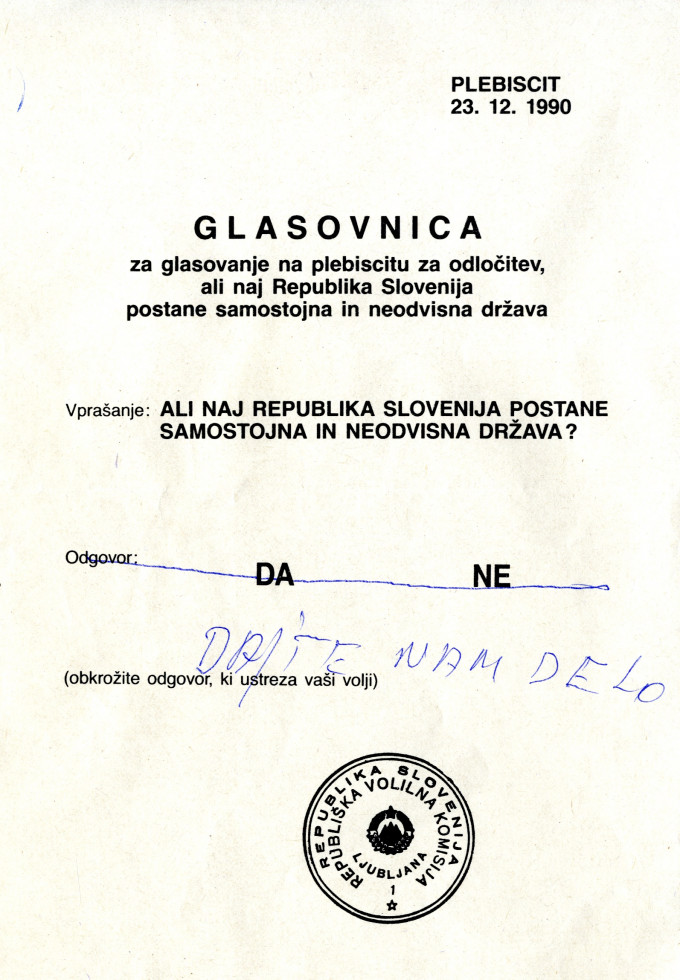Invalid Ballot Papers Casted at the Plebiscite for the Slovenian Independence
December 23, 1990
Original, print, 3 paper sheets
Reference code: SI AS 1210, Zbirka Plebiscit 1990, box 462, 464, 476

Invalid ballot paper. SI AS 1210, Zbirka Plebiscit 1990, šk. 476. | Author Archives of the Republic of Slovenia
»Give Us Work«
Invalid ballot papers have in recent years become something of a public interest. For a long time, it was believed that such ballot papers were only a matter of voters making all kinds of mistakes when casting their votes and a sign of their incompetence and ignorance. It turns out, however, that invalid ballot papers can also be a good indicator of the behaviour and thinking of the voters and can serve as a good indicator of the state of society as a whole.
Invalid ballot papers casted at the plebiscite for the independence of the Republic of Slovenia are a case in point. To refresh our memory: at the plebiscite on December 23, 1990, with 93.3 % voter turnout, as many as 88.5 % or 1,289,369 of all the voters entered on the electoral roll circled “YES” to the question “Should the Republic of Slovenia become a sovereign and independent state”, and, by doing so, they casted a vote for the independent state of Slovenia. December 2022 thus marks the 32nd anniversary of Slovenian people overwhelmingly expressing their will for their own country.
In accordance with the Plebiscite on Sovereignty and Independence of the Republic of Slovenia Act, published in the Official Journal of RS on December 6, 1990, the Republic Electoral Commission adopted instructions on how to conduct the plebiscite, stating among other things that records connected to the plebiscite were to be kept permanently. The brochure titled Electoral Committee and Its Tasks in Conducting the Plebiscite on December 23, 1990 defined the criteria for invalid ballot papers. A ballot paper was considered invalid if it: a) was empty, b) had both of the possible answers circled, and c) was completed in such a way that the will of a voter could not be determined. The Report of the Republic Electoral Commission on the results of the plebiscite states that among the 1,359,581 ballot papers casted, 12,412 (0.9 %) were invalid.
Invalid ballot papers primarily expressed voters’ fear of the uncertain future with inscriptions on them such as: “Give us work”, “There is no answer which would suit my will. Perhaps, a chance to survive”, “Work – honour – power and not the other way around” …
On January 20, 1994, the Archives of the Republic of Slovenia and the Republic Electoral Commission signed a contract no. 617-42-3/VŽ on the transfer of archival records. It stipulated that the Republic Electoral Commission would hand over to the Archives of RS all its archival records as well as the records of the municipal election commissions that were involved in the 1990 plebiscite. The contract stressed that records related to the plebiscite were characterized as archival records in their entirety and that the Archives of RS was to acquire them from the republic and municipal election commissions. The acquired archival records were at the Archives joined to form the Plebiscite Collection 1990 and were assigned the reference code SI AS 1210. The collection includes 562 archival boxes and in addition to paper records includes also a digital database Plebiscite 1990, which contains data on participation and voting results for the entire state, for individual municipalities and for individual polling stations within a certain municipality. The Archives of RS thus took over the responsibility of keeping and preserving this historically important archival material created during the turbulent times of the gaining of the Slovenian independence.
When commemorating the 20th and the 30th anniversary of the Slovenian independence we even managed to make a step forward. Through holding a physical and online exhibition (www.zbralismopogum.si) and preparing educational films and e-learning materials for primary and secondary schools, we managed to introduce the plebiscite records to a wider public. Our latest achievement, a book on the plebiscite titled “Zbrali smo pogum, stopili smo skupaj” was the result of a cooperation between the Archives of RS, Park of Military History Pivka and the National Education Institute of Slovenia. It is aimed at the young and at the young at heart and publishes the most important plebiscite archival documents.
The example of filling in an invalid ballot paper illustrates the spirit of the time when Slovenia was in the process of gaining its independence, it captures the yearning, expectations and also the fear of the uncertain future that awaited us. It also serves as an example of how to present this period in our history in an educational and innovative way.
Alenka Starman Alič
- Brodnik, Vilma; Starman Alič, Alenka; Čič, Ana: Zbrali smo pogum, stopili smo skupaj. Ljubljana: Mladinska knjiga, 2021.
- Felicijan Bratož, Suzana: Prevzem arhivskega gradiva plebiscitnega referenduma o samostojnosti Slovenije. In: Tehnični in vsebinski problemi klasičnega in elektronskega arhiviranja: zbornik referatov dopolnilnega izobraževanja s področij arhivistike, dokumentalistike in informatike 6, 2007, pp. 453–458.
- Zbrali smo pogum - historical project.

